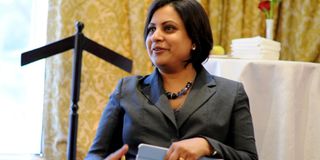Economy set for growth despite tourism lull and security threats

"The economy has demonstrated good momentum and has been growing faster than the official data indicated”
Ms Razia Khan, Standard Chartered Bank. FILE PHOTO | SALATON NJAU
What you need to know:
- The September BSI denotes that despite increased security threats and reports of a weak tourism season, the business environment in Kenya is still resilient.
- This is in regard to new business orders, production, employment, order backlogs and supplier deliveries. All these components, except order backlogs, increased in September, indicating a sound business environment.
- The Standard Chartered MNI BSI polls up to 200 business executives representing different sectors of Kenya’s economy — manufacturing, services, construction and agricultural firms. They answer questions on how they feel about current and future economic conditions.
Business leaders have “extremely high” confidence that the economy is set for strong growth in spite of a slowdown in tourism and the recent security threats.
Releasing the first of its Business Sentiment Indicator (BSI) report, Standard Chartered Bank notes that although their confidence barometer has returned above the 50 per cent mark since the results were first collated in February, the September improvement to 65.3 per cent from August’s 56 per cent is notable.
“Business confidence in Kenya appears to be extremely strong,” the Standard Chartered report indicates. “The optimism was also broad-based. Ten of the 15 current conditions indicators picked up. Of the individual components of our BSI, both new orders and current production rose to series highs.”
NOTEWORTHY FINDINGS
The bank, which will officially launch the new economy barometer next month, warns that the “survey has too short a history to justify drawing any firm conclusions, and much will depend on whether the positive sentiment is sustained. But it says the findings are nonetheless noteworthy.
The Standard Chartered MNI BSI polls up to 200 business executives representing different sectors of Kenya’s economy — manufacturing, services, construction and agricultural firms. They answer questions on how they feel about current and future economic conditions.
The survey, which is undertaken in partnership with international research firm MNI Indicators, seeks leaders’ views on whether business activity has increased, decreased, or remained the same, compared with the previous month.
The leaders are also asked about their expectations over the next quarter. An indicator above 50 shows an expansion. One below 50 indicates a contraction; while a result of 50 means no change.
The September BSI denotes that despite increased security threats and reports of a weak tourism season, the business environment in Kenya is still resilient.
Although findings of the survey have a short history (they were initiated in February this year), the report is noteworthy, given it paints an overall picture of the status of the business environment.
SOUND ENVIRONMENT
This is in regard to new business orders, production, employment, order backlogs and supplier deliveries. All these components, except order backlogs, increased in September, indicating a sound business environment.
Overall, business conditions firmed to 73 in September (from 61.4 in August) on the indicator, as many companies reported higher sales and orders. New orders also increased for a third consecutive month, reaching a new series high.
Increased export momentum appears to have driven much of this gain, with export orders rising to 74.6 in September from 55.2 in August.
The report also suggests that rebasing of Kenya’s GDP did not reveal a dramatically different structure in the economy, suggesting that the survey’s samples remain broadly representative.
Rebasing of Kenya’s GDP on September 30 saw the size of the economy hit Sh4.76 trillion in 2013, up from an earlier estimate of Sh3.8 trillion.
This made Kenya join lower middle income status with average per capita income of $1,246, with the growth rate for 2013 revised to 5.7 per cent from 4.7 per cent earlier.
“This confirms what we had previously suspected — that the economy has demonstrated good momentum and has been growing faster than the official data indicated.
It fits with much of the anecdotal evidence available to us: robust business confidence, increasing capex plans, and healthy private sector credit growth,” said Ms Razia Khan, the managing director of Macro Research at Standard Chartered Bank.





